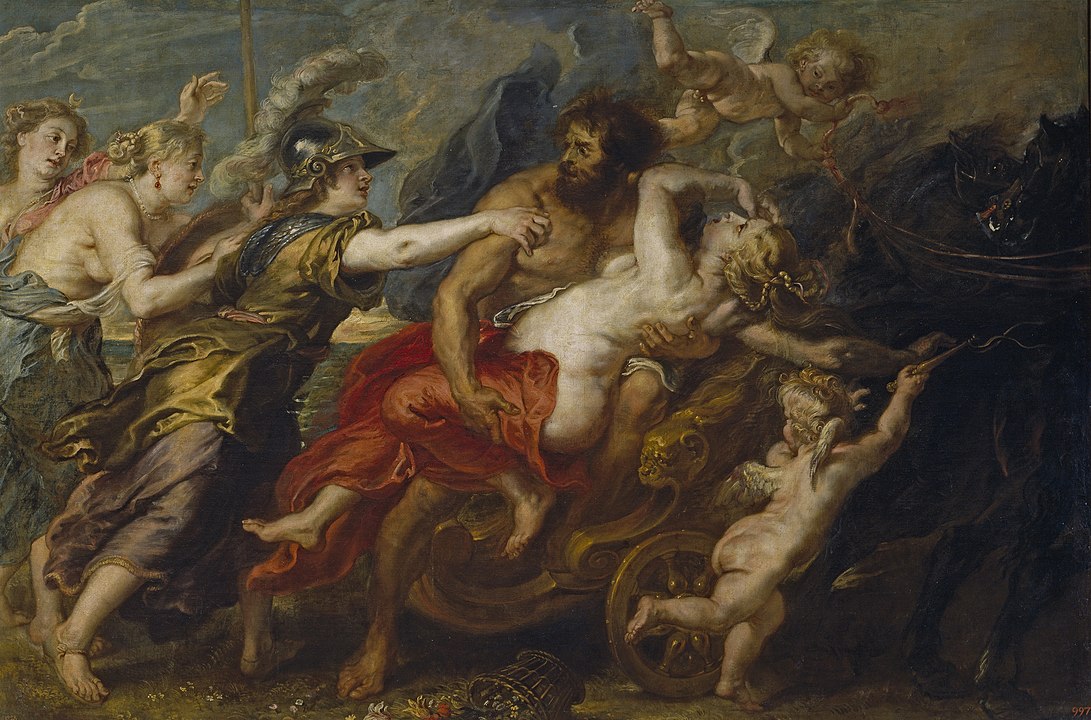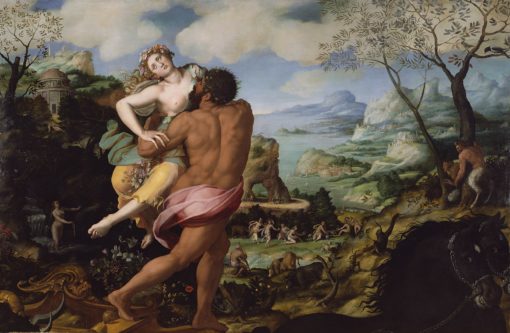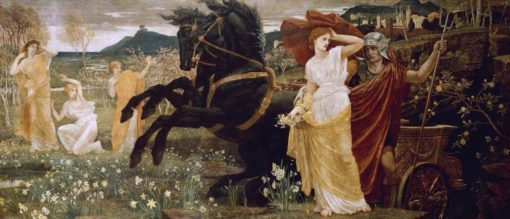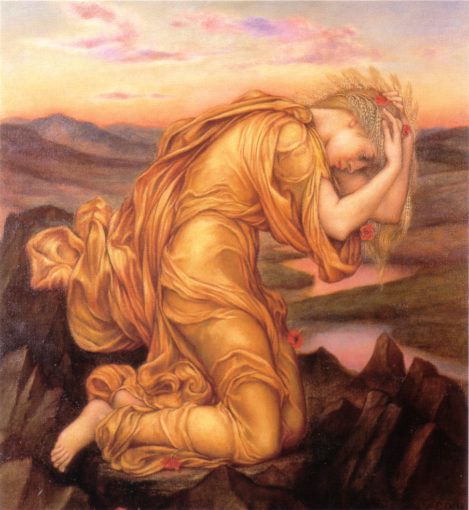
Interpretations offered by academics are trite. Yet their “authoritative” views are published, accepted and shared with the general public. Subsequently, academia has the last say and myth is effectively written off as ancient drivel.
Ancient myth is certainly not trite. World mythologies contain timeless wisdom hidden in the symbolism. When you take the time to learn what these enlightening stories really mean, you will have a deeper understanding of yourself, expand your conscious awareness and release repressed emotions.
Scholars generally acknowledge that the story recounting Hades Rape of Persephone is an allegory for the changing of the seasons and how crops grow. Others suggest the myth explains marriage.
Yet at the same time, scholars tell us the secrets of the Eleusian Mysteries were so closely guarded that anybody found revealing them would be punished by death.
Death is a harsh punishment for revealing the changing of the seasons and how to plant crops. People are dependent on food. Mankind needs to know how to cultivate food.
I appreciate the ancient Greeks may have joked that marriage was death but its still not a topic any credible writer would describe by a beautiful young maiden being abducted by a man that lives underground. Rape doesn’t feel like the right topic for explaining marriage does it?
For a myth that has endured thousands of years and was central to the initiations rites of Eleusian Mystery Schools, the suggestions proposed by scholars do not make rational sense. As a student and teacher of esoteric symbolism, I know there is a deeper meaning.
Other theories emerging from academia suggest the myth of Persephone’s abduction by Hades is a preparation for death. This makes more sense given Demeter’s relationship to agriculture and the cycle of the seasons is akin to life, death and rebirth.
A typical interpretation given for the rituals Eleusian schools performed with regards to the Abduction of Persephone can be found on worldhistory.org:
“The rituals were based on a symbolic reading of the story of Demeter and Persephone and provided initiates with a vision of the afterlife so powerful that it changed the way they saw the world and their place in it. Participants were freed from a fear of death through the recognition that they were immortal souls temporarily in mortal bodies.”
So are scholars saying that anyone who overcame the fear of death, would be put to death if they told the uninitiated how to overcome the fear of death?
It’s not very likely. The ancient Greeks were not ‘primitive’.
If these people paid for an education in classical mythology, they should ask for their money back.
The most sensible theory to emerge from academia was proposed some forty years ago by H. Jeanmaire who noted the Eleusian Mystery schools taught initiation rituals to women. [1]
Homer’s Hymn To Demeter does explain initiation rites. [2] Whilst they may have applied to women more than men in ancient Greece, today, in my view, they are not only initiation rites for women, they are initiation rites for everyone.
H Jeanmaire’s view for Hades Rape of Persephone is the maturation of the feminine psyche from maiden to womanhood. Scholars base this interpretation on the fact that the Homeric word Kore meant “young girl of initiatory age”. [3]
There were two stages to the Elueusian Mysteries that initiatives had to pass to acquire the enduring secrets of life’s mystery. The Lesser Mysteries are said to have consisted of “procession, sacrifice and purification.”
The Lesser Mysteries took place in the Spring and involved fasting, washing and sacrificing pigs by fire. The purpose of these rituals was to purify initiates and served as preparation for the Greater Mysteries held six months later to mark the Autumn season.
Mara Lynn Keller, ph.D. explains in her wonderful thesis, The Ritual Path of Initiation into the Eleusian Mysteries how the rituals performed by initiates helped them in their personal lives. She concludes:
“In the Eleusinian Mysteries of Demeter and Persephone, a person could experience the renewal of his or her humanity and also the renewal of their connection to divinity, nature, community, and the cosmos. As the rites concluded, the initiates returned home with a new vision of life, blessed by the mysterious gifts of beauty and love.”
Keller’s explanation that Persephone’s abduction relates to initiation rites is closer to the truth but you still need to know what is meant by a “connection to divinity, nature…and the cosmos.”
All these terms are symbolic of your True Nature and the connection we have to the morphogenetic field. Life, death and rebirth is the transformation of energy; existing form (Persephone), destruction (Hades), rebirth (Demeter).
Followers of the Eleusian Mysteries recognised Demeter, Persephone and Hades as a trinity. In Attica, Demeter and Persephone were pictured as twins indicating they are recognised as the same aspect of consciousness.
Furthermore, the symbolic meaning of agriculture and fertility relates to the tasks involved during the process of transforming energy. The tasks you perform determines which energies you manifest.

The myth of Demeter and Persephone is about cultivating thoughts, emotions and behaviours that bring you a better quality of life. It was the secrets to life that were taught in the Mysteries at Eleusis.
When you look after yourself – psychologically and emotionally as well as physically – you develop your sense of self-worth.
In the following interpretation, I explain how the Homeric Hymn to Demeter is a lesson of personal transformation using the principles of archetypal psychology. The interpretation of symbols are grounded in esoteric wisdom.
The secrets of the Eleusian Rites teach us the importance of nurturing the seeds planted by the conscious mind so that we can transform subconscious programs into blooming flowers and fruit-bearing trees; the fruits of the Earth are the sweet moments created by your subconscious.
When maiden’s and princes appear in myth, they represent the immature ego; an undeveloped subconscious. The seeds you plant in your subconscious through thoughts, feelings and experiences require nurturing. The more nourishment you provide your subconscious, the wiser you become – symbolised by the Crone.
On that note, let’s meet the maiden of the story, the Kore, Persephone. The following extract is taken from Homer’s Hymn To Demeter. If you want the full interpretation of the meaning behind Hades Rape of Persephone, sign up as a VIP member by purchasing a symbolism course.
All our VIP members get access to in-depth content that enables you to explore myth, symbolism and psychology in more detail. The resources we offer at Master Mind Content are powerful self-development tools designed to help you heal emotional trauma and expand conscious awareness.
Persephone is the daughter of Zeus and Demeter. Homer describes her as being renowned for her beauty. When Hades first sees her, he falls in love. Dissatisfied with his lonely existence in the gloomy depths of the underworld, Hades approaches his brother to ask for Persephone’s hand in marriage.
Knowing that Demeter would never consent to such an arrangement, Zeus refrains from expressing his consent to Hades. Although he does not outright refuse his brother, Hades takes this as a sign of encouragement. Zeus even helps to plot the abduction of his daughter.
One day, whilst the Kore (young maiden) is out picking flowers on the Plains of Nysa, Hades seizes his opportunity. Persephone is lured away from a party of 23 women – which includes Athena and Artemis – by an enchanting narcissus. The flower had been planted purposely to trap her.
“[the narcissus flower] was grown as a lure for the flower-faced girl by Gaia. All according to the plans of Zeus. She [Gaia] was doing a favour for the one who receives many guests [Hades].” ~ Homeric Hymn To Demeter translated by Gregory Nagy
Hades appears from beneath the earth and bundles Persephone into his golden chariot drawn by immortal winged horses.
Hades represents a complex, illness, disease or other Shadow energy that makes you “act out of character”. Jung notes that unconscious energies can take possession of the individual to indicate that something is wrong.
“…contents which the conscious cannot assimilate can evolve spontaneously out of the unconscious, and the repression hypothesis is inadequate in such instances. Moreover, the essential autonomy of these elements can be observed in the effects of daily life which obstinately obtrude themselves against our wills, and then, in spite of our earnest efforts to repress them, overwhelm the ego and force it under their control. No wonder that the primitive either sees in these moods a state of possession or sets them down to a loss of soul. Our colloquial speech reflects the same thing when we say: Ί don’t know what has got into him today; ‘He is possessed of the devil’; ‘He is beside himself’; ‘He behaves as if possessed’.” ~ Carl Jung, Commentary on The Secret of the Golden Flower
In the Hymn to Demeter, the force taking possession of the ego is depression.
Anyone that recognises they have a complex seeks a cure. They initiate the search for a treatment or a solution. This is why scholars are almost correct in their assumption that the Eleusian Mysteries are about Initiation Rites of Women. In symbolism, women represent emotions, feelings and the inner world.
The symbolism in the opening scene of Homer’s Hymn To Demeter provides information with regards to Persephone’s immature state of mind.
Firstly, the island of Nysa is dedicated to the god Dionysus, known for being dismembered and “thrice born”. In psychological terms, dismemberment reflects dissociation; losing touch with your sense of self.
So by placing Persephone in Nysa, Homer is telling us she is disconnected from her emotions and out of touch with reality.

Disassociation can occur in various ways but are most common when we experience an event the brain deems traumatic.
It should be noted that emotional trauma does not have to be a tragic or physically devastating event like breaking a leg or falling from a horse. Traumas occur when the idyllic paradise you thought you were living in is shattered.
Early trauma typically occurs when a child has an experience that triggers overwhelming stress. This may be through neglect, harassment, abuse embarrassment, or a situation in which they feel unsafe or helpless.
The first trauma you experience is birth. The second, which comes in quick succession is abandonment. Your first day on planet earth exposes you to a least two traumatic experiences.
I don’t know whether either of these two events causes dismemberment, but it stands to reason that if these traumas are reinforced during childhood through neglect, a lack of emotional wellbeing and other factors, they will be coded into the personal unconscious as a program.
Subconscious programs are reflected by Persephone picking flowers. Flowers represent consciousness that has blossomed in the light of the mind; thoughts, habits, perceptions, beliefs and attitudes.
You will know from experiences that not all flowers are beautiful, nourishing and healing; some are intoxicating, some are deformed and some are never born.
The narcissus flower is poisonous. Persephone’s fascination with the deadly flower mirrors her poisonous mind. A lack of self-esteem secretes energy into your subconscious which is destructive to your way of life.
“Narcissism is yet another pitfall for some Persephone women. They may become so anxiously fixed on themselves that they lose the capacity to relate to others. Their thoughts are dominated by self questions: “How do I look? Am I witty enough? Do I sound intelligent?” And their energy goes into makeup and clothes. Such women spend hours in front of mirrors. People exist only to give them feedback, to provide them with reflecting surfaces in which to see themselves.” ~ Jean Shinoda Bolen MD, Goddesses in Everywoman
When we examine Persephone’s family life more closely, we find the same traits are described in myth as they are in real life.
Zeus is a distant father that rapes his daughter. Demeter smothers her with too much love. This is what psychologists refer to as an overbearing mother.
We know from clinical studies that child abuse and a lack of emotional wellbeing destroys a person’s sense of wellbeing and self-worth. These are typical traits in someone suffering from a Father Complex.
Jung described the Father Complex as an “animus possession”. This analogy is described by the ancient Greeks by Zeus raping Persephone.
Parents that are overprotective stunt the psychological development of their offspring. Unless a child is allowed to learn through experience, they will grow up helpless, immature and struggling to find a purpose in life.
Homer describes Persephone as the “one with the delicate ankles.” Ankles symbolise independence, flexibility and the ability to stand on your own two feet.
Delicate ankles, therefore suggest, Persephone mental capacity is fragile and vulnerable. She does not have the emotional stability to make her own choices, cannot adapt to the flow of life and does not know which direction to take her life.
In contrast, Demeter is described as having “beautiful ankles’ a symbol of self-confidence and a strong connection to the world around you.
Individuals that are not emotionally nourished (as children or as adults) have a lack of confidence because they have not developed a sense of individuality, purpose or meaning.
This state of mind is confirmed when we are told that Persephone is drawn towards an enchanting narcissus, a flower of such awe and splendour “its sweet fragrance spread over the wide skies.”
The narcissus flower represents the emotional immaturity of an ego-centred psyche. This state of mind is a condition seen in people that have lost their sense of self, and with it, the meaning of life.
To use archetypal symbolism as a self-development tool, it’s useful to understand what the gods and other characters represent in relation to the mind-body-energy connection.
Zeus, the god of the Sky and Earth represents the Self-ego axis; the brain and the seat of consciousness. As the king of the gods, he is the decision-making function. The Sky is the conscious mind. The earth is the subconscious mind to which the ego responds to.
Demeter, Goddess of the Grain, is also an aspect of the conscious mind (planting seeds, nurturing) that naturally has an impact on the subconscious and, ultimately, the cells of the body (mortals, humans). The earth that Demeter cares for represents the subconscious mind.

Her role as a fertility goddess, Mother Earth, is synonymous with the caregiver archetype, the function that provides emotional nourishment. The role of the caregiver is to nurture self-worth in order to cultivate a healthy, fertile and abundant life (blossom, fruits, crops etc).
Hades, as we established above, is the unconscious mind in which content that is unknown to the ego is buried. He is the personification of what we describe today as the Shadow personality.
Homer tells us that the Lord of the Underworld “appears from beneath the earth”. Homer’s description shows us there are two functions to the unconscious; the subconscious which stores programs and memories that are easily retrieved and the unconscious which is generally believed to harbours your demons.
If the earth is the subconscious, then we can deduce the Underworld is where split-off fragments of consciousness are buried – the land of the dead which describes unlived consciousness.
It’s worth noting that the contents of the unconscious are not only where you suppress demons. Jungians acknowledge it’s a great source of wealth also. The ancient Greeks also knew this. Another name for Hades is Ploutos, meaning god of abundance or wealth. Demeter also has a son called Ploutos.
“If a man’s attitude is friendly toward his inner shadow, and he is willing to grow and change, the shadow will often appear as a helpful friend, a body, tribal brother who helps him in his adventures, maximum up, and teaches him skills. If he is trying to repress his shadow it will usually appear as a hateful enemy, Bouton monster who attacks him in his dreams. The same principles apply to a woman. Depending on her relationship to her shadow, she may appear as a loving sister or as a frightful witch.” ~ Robert Johnson, Inner Work
As the Kore, Persephone represents an individual with an undeveloped mind. She reflects individuals that live in ego-conscious only. They are weak-minded, obsessed with material possessions, have no purpose or meaning in life and lack emotional stability.
As Queen of the Underworld, she is feeling-based content that is buried in the unconscious. Through self-reflection, these stirring of new life rise to the surface of the conscious mind and serve as a catalyst for new ways of being (the season of spring).
In Attica, Demeter and Persephone were thought of as two goddesses in one and are depicted as sisters. On the one hand, this means they represent the same aspect of consciousness, but as mother and daughter they are in different stages of development.
Devotees of the Eleusian Mysteries paid tribute to the three stages of a woman’s life; maiden, mother, crone. Applied to the development of the psyche, this translates to immaturity, developing conscious awareness and wisdom.
This idea is played out through the descriptions of the two women in Homer’s Hymn To Demeter. Persephone is initially described as “delicate” (fragile) and Demeter is described as “awful” implying she maltreats her daughter, and thus herself.
This brings us back to the foundational function of the caregiver archetype; self-worth which is nurtured through self-care and self-respect. Homer shows you how.
Why not sign up for a Master Mind Symbolism course or our Essential Self-Development Program and become a VIP Member!
When you subscribe to any of our programs, you get access to loads of supporting content that takes you deeper into the symbolic meaning of ancient mythology – and thus a deeper into your understanding and appreciation of your True Self.
In the VIP Members Area, you will be able to access the full interpretation of Homer’s Hymn To Demeter here. You will also find more information about the Caregiver and other archetypes.
Ancient myths show you how to cultivate a richer quality of life. Moreover, archetypal symbolism is a very powerful self-development tool because the myth helps you to identify which archetypal energies you are projecting and provides insights that are conducive for healing and expanding conscious awareness.
References
[1] H. Jeanmaire, Couroi et Couretes (Lille: Bibliotheque Universitaire, 1939) 269-79, 298-305.
[2] The Rape of Persephone: A Greek Scenario of Women’s Initiation, Bruce Lincoln
[3] H. Jeanmaire, Couroi et Couretes (Lille: Bibliotheque Universitaire, 1939) 269-79, 298-305.
